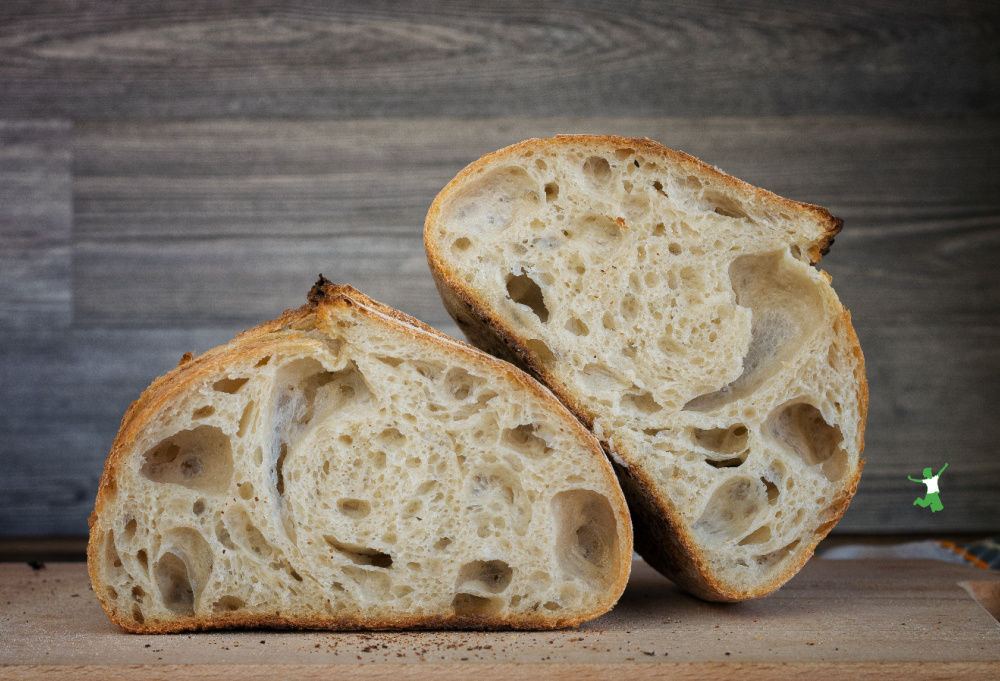Table of Contents[Hide][Show]
Research suggests that people with celiac disease tolerate sourdough bread where the dough is fermented with a specialized sourdough starter in accordance with traditional methods.

Buyer beware! Most breads labeled as “sourdough” on the market today are anything but…
These fake sourdough breads typically contain yeast and/or a sweetener.
This is an easy giveaway clue that the bread is a phony and should be avoided if one seeks a traditionally baked loaf.
Baker’s Yeast Is Not Traditional
When baker’s yeast was first introduced in France as an alternative to sourdough starter in the mid-1600s, it was strongly rejected!
The scientist-noblemen of the day knew that it would negatively impact people’s health. When the Faculty of Medicine decided to formally examine the question, they banned its use. (1)
True sourdough bread does not contain baker’s yeast. Instead, a Lactobacilli-based starter culture is used.
In addition, authentic sourdough is baked at a lower temperature for a longer period of time.
These methods protect the integrity of the cereal grains and preserve nutritional value.
What’s more, anti-nutrients such as phytic acid are eliminated, and gluten, that very difficult-to-digest plant protein, is significantly broken down.
As a practical bonus, sourdough bread stays fresh longer than yeasted bread.
Despite the initial rejection of baker’s yeast, the convenience aspect of quick-rise yeasted loaves resulted in widespread adoption over the last century.
It is no surprise, then, that the skyrocketing cases of gluten intolerance and celiac disease have risen in lockstep over the decades.
Why did pre-industrialized people groups consume gluten-containing breads with no digestive difficulty whatsoever?
Could it be that the traditional preparation methods were somehow protective?
Sourdough and Celiac
The peer-reviewed Journal of Applied and Environmental Microbiology researched this very question, publishing a study conducted in Europe that examined how celiacs tolerate true sourdough bread. (2)
Seventeen people suffering from celiac disease were given 2 grams of gluten-containing bread risen with either baker’s yeast or a Lactobacilli culture.
Thirteen of the seventeen participants showed negative changes in intestinal permeability consistent with celiac disease. Four participants did not show any negative changes.
Then, all the study participants were given true sourdough bread fermented with a special Lactobacilli culture able to break down the primary amino acid building block that causes an immune response in people with celiac.
None of the study participants showed any negative changes in their intestinal permeability after consuming the bread baked using 30% wheat flour and a mix of oat, millet, and buckwheat flour.
The researchers’ conclusions were summarized as follows:
These results showed that a bread biotechnology that uses selected lactobacilli, nontoxic flours, and a long fermentation time is a novel tool for decreasing the level of gluten intolerance in humans. (3)
What I find interesting about the study is that even when the people who consumed the wheat bread baked with either baker’s yeast or a normal Lactobacilli culture, four (nearly one-quarter) did not show any negative changes to their baseline values of intestinal permeability.
Did these people consume bread raised with a normal sourdough culture?
If so, perhaps even regular sourdough cultures would be sufficient for some celiacs to consume.
Certainly, most with simple gluten intolerance would find true sourdough bread to be easily consumed with no digestive distress.
It seems that the noblemen in the court of Louis XIV of France had it right all along.
Abandoning the traditional methods of bread preparation in favor of baker’s yeast would have disastrous effects on people’s health.
Little did they know that their wisdom several centuries later would be termed “novel” by scientists in the biotechnology industry!
(1) History of Baker’s Yeast
(2, 3) Study Finds Wheat-based Sourdough Bread Started with Selected Lactobacilli is Tolerated by Celiac Disease Patients
More Information
No-Knead Einkorn Sourdough Bread
The Good Gluten You Can Probably Eat Just Fine
The Real Reason Wheat is Toxic (It’s Not the Gluten)








Hi Sarah, great article! I found a yeast free “Coarse rye” bread at the store that I am hoping is a true sourdough..
These are the ingredients: Coarse cracked rye, filtered water, sourdough (Whole rye, filtered water), seasalt
Is this a true sourdough? Thanks!
It sure looks real! I would double check with the company that sells it to see how long the dough ferments before the bread is baked. The longer the better!
Sarah, I’ve been telling the world about this new-to-me information learned here and today linked to one of your related sites in my post about (True) Sourdough Artisan Bread.
Sarah, I just recently started making true sourdough bread and found this older post of yours when I was looking for some info to share with a gluten-free friend tomorrow. Your blog has been on my Sites I Visit list for years!
In AZ/USA Trader Joes or Sprouts have no added yeast white sourdoughs:TJs has cornmeal on the bottom of their artisan paper bagged loaf, in case of people not intaking corn. TJs also have plastic bagged version of sourdough:Some have whole grain. I can’t find a true and white spelt sourdough here in the US since Pacific Bakery’s is’nt anywhere to be found. That was the ultimate in convenience!
I buy the plastic bagged version of sourdough at TJ’s. It says whole wheat. Does that type have the added yeast or is that the real stuff? Thanks
As in the article, if it’s true sourdough, yeast won’t be in the ingredients.
Lacy Benkley
This is just stupid…. So celiac should avoid ALL the other similar proteins, like those found in coffee say… ( Recent article I just read.) but sour dough shouuuld be ok? Um, thanks, No.
I so look forward to trying this after I finish healing my gut on GAPS.
Love that you covered this subject. I’ve been wondering about this for the past few weeks.
Very interesting, since stopping wheat i also cannot tolerate gluten free yeasted breads. Cultures for health has a brown rice sourdough culture i would love to try.